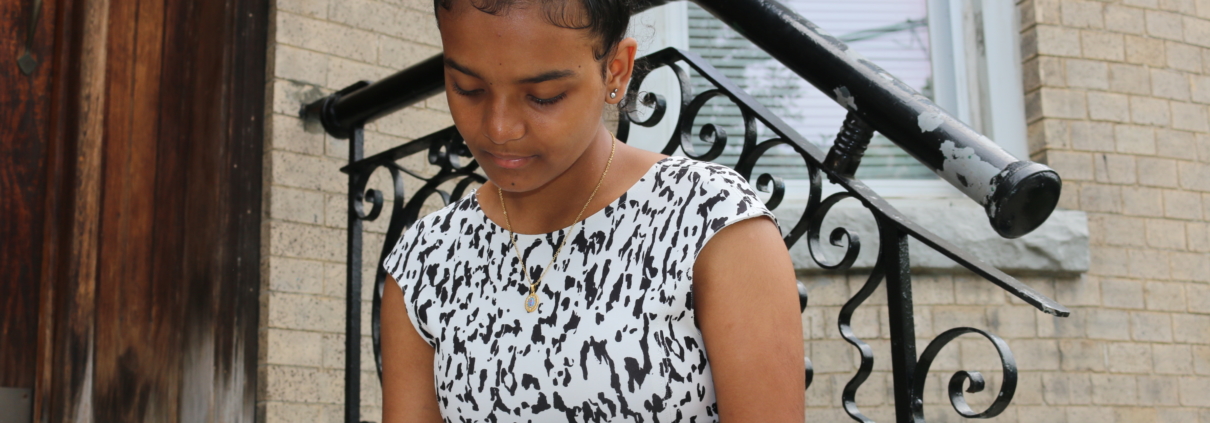Our Work Continues: Rehabilitating Youth and Families with Alternatives to Incarceration
For over 150 years, The New York Foundling has worked in partnership with our neighbors to ensure that everyone can meet their full potential when facing challenging situations. This hasn’t changed, and our staff continue to provide life-changing and meaningful support in light of the COVID-19 pandemic. This series shares how The Foundling’s many programs are responding to the needs of their community.
Youth who are tried as adults for crimes committed while under the age of 19 face the very real threat of being sentenced to adult prison with adult convictions that impact their futures. The Foundling’s Families Rising program is one of a select few that targets this high-risk population and provides them with evidence-based Functional Family Therapy (FFT) as an alternative to incarceration.
Families Rising works to reduce family conflict, substance abuse, recidivism, and violent behavior in the long term. In addition to its historically high rates of treatment completion, the program has demonstrated a significant impact helping participants with viable alternatives that avoid incarceration and a criminal record, leading them to stay in school and avoid re-arrest. The program is also estimated to save taxpayers millions of dollars each year in incarceration costs.
Throughout COVID-19, our dedicated Families Rising team has continued to provide FFT treatment and support to youth and their families.
Before youth can be screened into programs like Families Rising, which is a rehabilitative alternative to incarceration, they have to wait for a court referral. With criminal courts closed due to COVID-19, referrals of youth to The Foundling’s Families Rising program have decreased dramatically. Virtual court hearings are at a minimum, reserved only for the highest-risk cases.
But for the many young people who are already enrolled in Families Rising, therapy sessions have continued during COVID-19 but in a telehealth format. “We’ve had more instances of rescheduling,” says Kimberly Sweeney, a Families Rising Supervisor. “Because of COVID-19, we cannot rely on popping up at someone’s home for a session, so we are now addressing potential attendance struggles as a clinical matter in therapy sessions.”
Negative peer influences, fights with family, and impulsive decision-making are the most common trouble factors for youth. “Kids do what other kids are doing,” says Kimberly, “Since other kids are staying home due to COVID-19, the kids we help are, too. So that works to our advantage.”
Family involvement is an incredibly important factor in the program’s success. “One of my kids wasn’t going to school,” Kimberly explains, “But then his older brother came home from college early because of COVID-19. Our client started logging into the remote learning platform and began sending screenshots of the work he was doing to both myself and his school counselor. His brother was such a good influence. He reinforced all the skills and good behaviors we were trying to teach.”
And moments like this one couldn’t happen if youth are tried as adults and put in adult prisons. “Flooding the criminal justice system isn’t going to help kids make better choices, go to school, or improve their family and community relations,” Gomattie states, “It’s not going to fix recidivism.”
“If the risk of punishment at Rikers was enough to encourage people to behave differently, then it would have worked already,” adds Kimberly, “Families need more support addressing maladaptive behaviors, so their kids don’t end up in Rikers.”
“We need more programs like Families Rising—programs that actually address the issues that got the kid arrested in the first place,” Gomattie continues, “If we don’t treat the root causes, how are we going to produce any real lasting results?”
To learn more about how The New York Foundling is responding to the COVID-19 pandemic in New York, visit our emergency response page. Stay tuned for more stories from the frontlines as we continue to support our neighbors on paths to stability and strength.
Read past posts in the ‘Our Work Continues’ blog series:
- Closing the Achievement Gap for Youth in Foster Care
- Community Services Keep Staten Island Families Connected
- Perseverance and Compassion in our Homes for Adults with Developmental Disabilities (Part 2)
- Perseverance and Compassion in our Homes for Adults with Developmental Disabilities (Part 1)
- School Based Mental Health Services still Mitigating Crises
- Bringing Day Habilitation into the Homes of People with Developmental Disabilities
- Foster Care Systems Supporting Families Despite Social Distancing Challenges
- Supporting Youth as they Age out of Foster Care
- Preventing Child Abuse for Families in Social Isolation
- Mobilizing a School to Support a Community

